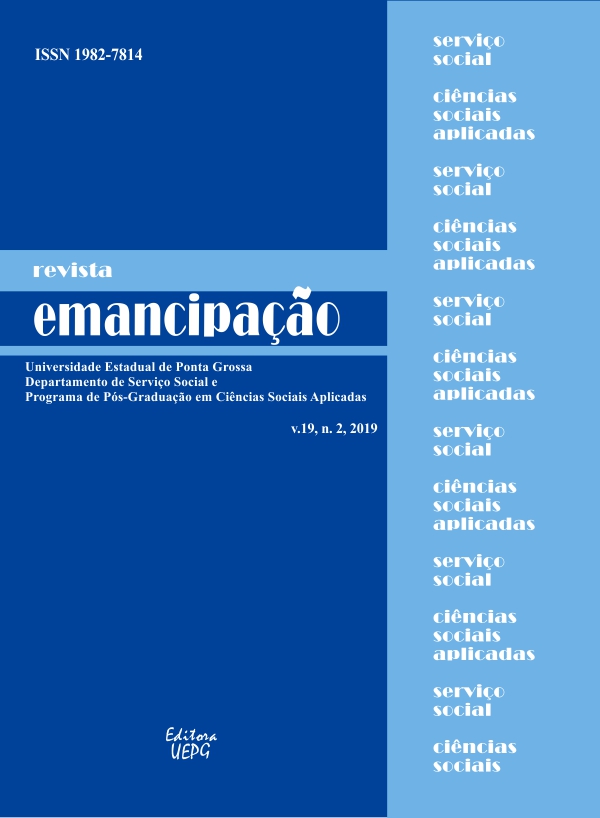Tecnologias digitais de informação e comunicação ( TDIC ) nas graduações de Serviço Social no Estado do Paraná (Digital information and communication technologies ( ICT ) in Social Service graduations in the State of Paraná)
Conteúdo do artigo principal
Resumo
Este artigo traz os resultados do estudo exploratório e descritivo que teve entre seus objetivos: a) identificar o número de graduações em Serviço Social ofertadas no estado do Paraná; b) reconhecer se, nas matrizes curriculares dos cursos, há disciplinas voltadas ao ensino sobre TDIC; c) refletir sobre as possiblidades e os limites das TDIC no âmbito do Serviço Social. A primeira aproximação com a questão se deu a partir do material disponível online. O estudo constatou que decorreram mais de 20 anos desde a promulgação das Diretrizes Curriculares para os cursos de Serviço Social, quando já havia sido estabelecido que, dentre as competências a serem alcançadas pelos futuros assistentes sociais em formação, estava a de dominarem os recursos de informática. Atualmente, porém, menos de 20% das graduações ofertadas no estado do Paraná possuem a temática em suas matrizes curriculares.
Downloads
Detalhes do artigo
Autores que publicam nesta revista concordam com os seguintes termos:
a) Os autores mantém os direitos autorais e concedem à revista o direito de primeira publicação, com o trabalho simultaneamente licenciado sob a Creative Commons Attribution License (https://creativecommons.org/licenses/by/4.0/deed.pt_BR) que permite o compartilhamento do trabalho com reconhecimento da sua autoria e publicação inicial nesta revista.
b) Esta revista proporciona acesso público a todo o seu conteúdo, uma vez que isso permite uma maior visibilidade e alcance dos artigos e resenhas publicados. Para maiores informações sobre esta abordagem, visite Public Knowledge Project, projeto que desenvolveu este sistema para melhorar a qualidade acadêmica e pública da pesquisa, distribuindo o OJS assim como outros softwares de apoio ao sistema de publicação de acesso público a fontes acadêmicas. Os nomes e endereços de e-mail neste site serão usados exclusivamente para os propósitos da revista, não estando disponíveis para outros fins.
This journal provides open any other party.
Esta obra está licenciada sob uma Licença Creative Commons.
https://creativecommons.org/licenses/by/4.0/deed.pt_BR.

Referências
BARROCO, Maria Lúcia S. Barbárie e neoconservadorismo: os desafios do projeto ético-político. Serviço Social e Sociedade, São Paulo, n. 106, p. 205-218, 2011.
BELLUOMINI, Ellen. Technology Changing the Face of Social Work. The New Social Worker: the social worker carrer’s magazine, v. 20, n. 2, dez. 2013. Disponível em: http://www.socialworker.com/the_new_social_worker_print_edition. Acesso em: 31 jul. 2014.
BRASIL. Ministério da Educação. Instituições de Educação Superior e Cursos Cadastrados. e-Mec. 2016. Disponível em: http://emec.mec.gov.br/. Acesso em: 8 abr. 2016.
BRAZ, Marcelo. A hegemonia em xeque: projeto ético-político do Serviço Social e seus elementos constitutivos. Revista Inscrita, Brasília, n. 10, p. 5-10, 2007. Disponível em: https://issuu.com/cfess/docs/revistainscrita-cfess__10_. Acesso em: 13 jan. 2020.
COLMÁN, Evaristo; TOSCAN, Franciele. Tecnologias de informação, processos de trabalho do assistente social e formação profissional. Serviço Social em Revista, v. 5, n. 2, 2003. Disponível em: http://www.uel.br/revistas/ssrevista/c-v5n2.htm. Acesso em: 31 jul. 2014.
DAGNINO, Renato. O pensamento latino-americano em Ciência, Tecnologia e Sociedade (PLACTS) e a obra de Andrew Feenberg. In: NEDER, Ricardo T. (Org.). A teoria crítica de Andrew Feenberg: racionalização democrática poder e tecnologia. Brasília: Observatório do Movimento pela Tecnologia Social na América Latina/CDS/UnB/Capes, 2010. p. 25-48.
FEENBERG, Andrew. O que é filosofia da tecnologia? In: NEDER, Ricardo T. (Org.). A teoria crítica de Andrew Feenberg: racionalização democrática, poder e tecnologia. 2. ed. Brasília: Observatório do Movimento pela Tecnologia Social na América Latina/CDS/UnB/Capes, 2013. p. 51-64.
GONSALVES, Elisa Pereira. Conversas sobre iniciação à pesquisa científica. Campinas, SP: Alínea, 2001.
IAMAMOTO, Marilda Villela. O projeto profissional. In: IAMAMOTO, Marilda Villela. Serviço Social em Tempo de Capital Fetiche. São Paulo: Cortez, 2012. p. 222-233.
LOJKINE, Jean. A revolução informacional; trad. De José Paulo Netto. – 3.ed. São Paulo: Cortez, 2002.
NEDER, Ricardo T. (Org.). A teoria crítica de Andrew Feenberg: racionalização democrática, poder e tecnologia. Brasília: Observatório do Movimento pela Tecnologia Social na América Latina/CDS/UnB/Capes, 2010.
NETTO, José Paulo. Das ameaças à crise. Revista Inscrita, Brasília, ano VII, n. 10, p. 37-40, nov. 2007.
NETTO, José Paulo. A construção do Projeto Ético-Político do Serviço Social. In: MOTA, Ana Elizabete et al. Serviço social e Saúde: trabalho e trabalho profissional. 4. ed. São Paulo: Cortez, 2009. p. 141-160.
PINTO, Álvaro Vieira. O conceito de tecnologia. Rio de Janeiro: Contraponto, 2005. v. 2. p. 1- 531.
RAMOS, Sâmya Rodrigues. Limites e possibilidades históricos do projeto ético-político. Revista Inscrita, Brasília, ano IX, n. 12, p. 41-48, 2009.
VELOSO, Renato. Serviço Social, Tecnologia da Informação e trabalho. São Paulo: Cortez, 2011.
YOUNG, Jong Kim. New Information Technology and Social Work Education in South Korea. The International Journal of Continuing Social Work Education, v. 2, n. 1, p. 35-37, 1999. Disponível em: http://www.profdevjournal.org/ articles/21035.pdf. Acesso em: 31 jul. 2014.

